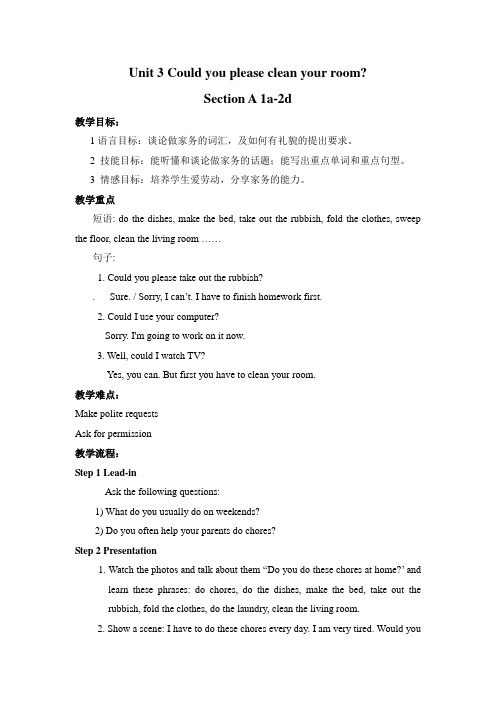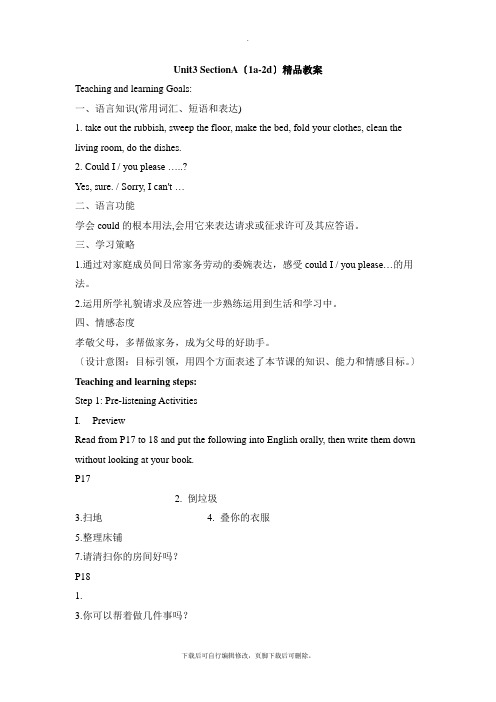英语人教版八年级下册Unit 3 Section A 1a-2d 教学设计
- 格式:doc
- 大小:51.00 KB
- 文档页数:7


Unit 3 Could you please clean your room?Section A 1a-2d教学目标:1语言目标:谈论做家务的词汇,及如何有礼貌的提出要求。
2 技能目标:能听懂和谈论做家务的话题;能写出重点单词和重点句型。
3 情感目标:培养学生爱劳动,分享家务的能力。
教学重点短语: do the dishes, make the bed, take out the rubbish, fold the clothes, sweep the floor, clean the l iving room ……句子:1. Could you please take out the rubbish?. Sure. / Sorry, I can’t. I have to finish homework first.2. Could I use your computer?Sorry. I'm going to work on it now.3. Well, could I watch TV?Yes, you can. But first you have to clean your room.教学难点:Make polite requestsAsk for permission教学流程:Step 1 Lead-inAsk the following questions:1) What do you usually do on weekends?2) Do you often help your parents do chores?Step 2 Presentation1. W atch the photos and talk about them “Do you do these chores at home?’ andlearn these phrases: do chores, do the dishes, make the bed, take out the rubbish, fold the clothes, do the laundry, clean the living room.2. Show a scene: I have to do these chores every day. I am very tired. Would youlike to help me fold the clothes? Could you please fold the clothes?3. Look these phrases and practice the conversation: Could you please take outthe rubbish? Sure. / Sorry, I can’t. I have to finish homework first.Step 3 Listening1b Listen. Who will do these chores? Check (√) Peter’s mother or Peter.Step 4 Practice1. 1c Make conversations about the chores in 1a.Make conversations.ExamplesA: Could you please...?B: Yes, sure. /All right. /No problem./Certainly.Sorry, I can't. I have to do...Sorry, I can't. I am doing...2. Play a game: Make conversations according to the instructions on the LuckyWheel and get certain points.ExamplesA: Could you please...?B: Yes, sure. /All right. /No problem./Certainly.Sorry, I can't. I...Step 5 Listening 2a&2b1. Peter asks his father if he can do four things. What does his father say? Check(√) “yes” or “no”. Listen again. Draw lines to the reasons.2. Listen again and fill in the blanks.Peter: Hey, Dad?Dad: Yes?Peter: _______ go out for dinner with my friends tonight?Dad: _____, that should be OK.……Dad: I guess so. But don't stay out late.Peter: _______ stay out until eleven? We might get something to drink after the movie.Dad: ____________. You have a basketball game tomorrow, remember?You need to have a good rest.Step 6 Practice2c Make conversations using the information in 2a and 2bA: Could I use your computer?B: Sorry. I’m going to work on it now.A: Well, could I watch TV?B: Yes, you can. But first you have to clean your room?2d Role –play the conversationStep 7 Language points1. Tony, could you please help out with a few things?help out 动词短语,表示在某人繁忙或遇到困难时“给予帮助”。

Unit3 SectionA〔1a-2d〕精品教案Teaching and learning Goals:一、语言知识(常用词汇、短语和表达)1. take out the rubbish, sweep the floor, make the bed,fold your clothes, clean the living room, do the dishes.2. Could I / you please …..?Yes, sure. / Sorry, I can't …二、语言功能学会could的根本用法,会用它来表达请求或征求许可及其应答语。
三、学习策略1.通过对家庭成员间日常家务劳动的委婉表达,感受could I / you please…的用法。
2.运用所学礼貌请求及应答进一步熟练运用到生活和学习中。
四、情感态度孝敬父母,多帮做家务,成为父母的好助手。
〔设计意图:目标引领,用四个方面表述了本节课的知识、能力和情感目标。
〕Teaching and learning steps:Step 1: Pre-listening ActivitiesI.PreviewRead from P17 to 18 and put the following into English orally, then write them down without looking at your book.P17________________ 2. 倒垃圾___________________3.扫地_________________4. 叠你的衣服________________5.整理床铺______________ _______7.请清扫你的房间好吗?__________________________________P181.3.你可以帮着做几件事吗?_____________________________4.如果她看到这样不整洁,她会不快乐的。


大地二中张清泉Section A 单词rubbish n.垃圾;废弃物 fold v.折叠;对折 sweep v.(swept)扫;打扫floor n.地板 mess n.杂乱;不整洁 throw v.(threw)扔;掷neither adv.也不; pron.两者都不 shirt n.衬衫 pass v.给;递;走过;通过borrow v.借;借用 lend v.(lent)借给;借出 finger n.手指hate v.厌恶;讨厌while conj.与……同时;当……的时候;而;然而chore n.杂务;乏味无聊的工作 snack n.点心;小吃;快餐短语take out the rubbish 倒垃圾 all the time频繁;反复as soon as 一……就……句型1.Peter,could you please take out the rubbish? 彼得,你能把垃圾倒了吗?2.And she won’t be happy if she sees this mess.而且如果她看到这么乱,她会不高兴的。
3.Could I at least finish watching this show?至少等我看完这个节目可以吗?4.For one week, she did not do any housework and neither did I.在—周时间里,她没有做任何家务,我也没有做。
5.I’ll finish my homework while you help me with the dishes.当你帮我洗碗的时候,我会完成家庭作业。
Section B单词stress n.精神压力;心理负担waste n.浪费;垃圾 v.浪费;滥用provide v.提供;供应anyway adv.而且;加之depend v.依靠;信赖develop v.发展;壮大fairness n.公正性;合理性since conj.因为;既然 prep.,conj.& adv.从……以后;自……以来neighbor(=neighbour) n.邻居ill adj.有病;不舒服drop v.落下;掉下fair adj.理的;公正的unfair adj.不合理的;不公正的snack n.点心;小吃;快餐independence n.独立independent adj.独立的;自主的短语in order to目的是;为了 depend on 依靠;信赖a waste of time浪费时间 take care of 照顾;处理句型1.Could I invite my friends to a party? 我能邀请我的朋友们参加聚会吗?2.They should spend theirtime on schoolwork in order to get good gradesand get into a good university.为了取得好成绩并考入一所好大学,他们应该把时间花在学业上。

Unit3 SectionA(1a-2d)名师教案1.0Teaching Analysis教情分析1.1Teaching Objectives 教学目标1.1.1Language goals 语言目标1.1.1.1 Key Words and Chunks1.1.1.1.1 For applying: do the dishes, make the bed, take out the rubbish, foldthe clothes, sweep the floor, clean the living room, no problem, goout for dinner, go to the movies, stay out late, get a ride, have to, need,work on, help out with, at least, finish, any minute now1.1.1.1.2 For comprehending: stay out late, get a ride, have to, need, workon, help out with, at least, finish, any minute now1.1.1.3 Sentence Structures1)Could you please take out the rubbish?Sure. / Sorry, I can’t. I have to finish homework first.2) Could I use your computer?Sorry. I'm going to work on it now.3)Well, could I watch TV?Yes, you can. But first you have to clean your room.4)A nd she won’t be happy if she sees this mess.5) Could I at least finish watching this show?6)I think two hours of TV is enough for you .1.1.1.4Grammar Focus1)C ould for polite requestsA:Could you please take out the rubbish?B:OK, but I want to watch one show first.A:Could you please take out the rubbish?B:Yes, sure.2)C ould for permissionA:Could I go out for dinner with my friends?B:Sure, that should be OK.A:Could you get something to drink after the movie?B:No, you can’t. You have a basketball game to morrow.1.1.2Ability goals 能力目标1.1.2.1 教会学生用could礼貌地提出要求和征求许可。
新目标八年级下册Unit 3 Could you please clean the room?Section A 1a-2d石家庄第二外国语学校周洁1.教材分析人民教育出版社《Go For It》教材不仅帮助学生学习英语语言知识,同时帮助学生发展语言运用能力,学会用英语表达思想,与人交流,用所学知识来解决问题。
各个单元以不同主题为线索,为学生设计了许多贴近生活、具有交际意义的任务或活动,以此激发学生英语学习的热情,使学生在较为真实的情境中感知语言,应用语言,参与课堂。
Unit3 Could you please clean your room? 以“家务和许可”为主题,以主动帮助家人做家务的实例,引导学生强化劳动观念,学会照顾自己,培养自身独立意识。
2.学情分析在学校分层小班教学的背景下,所教授的小班为A班,学生英语基础相对薄弱,需要夯实基础,稳扎稳打;他们有着极强的表现欲,需要在课堂训练中有更多机会展现自我;他们在英语学习上欠缺自信,需要得到教师的肯定以及自我认同;个别同学欠缺英语学习热情,需要在生动活泼的课堂中感受快乐。
3.教学目标语言知识(Language knowledge)(1)围绕本单元话题,学会准确地读出和使用rubbish, fold, sweep, floor, throw, borrow, lend,chore等词语。
(2)准确把握情态动词could的用法,能够礼貌地向他人用“Could you please…?”提出要求,用“Could I…?”请求许可,并对二者礼貌应答。
语言技能(Language skills)能够熟练应用“Could you please…?”提出要求,应用“Could I…?”请求许可,并能够礼貌回应他人的要求及请求;通过听力和阅读,获取所需细节信息;通过小组合作的方式,对提出要求和请求许可进行巩固训练,实现礼貌而顺畅的沟通。
学习策略(Learning strategies)养成自主预习,自主探究,合作互助的学习习惯;通过提前预览,预测听力所填内容;通过自主感知英语语言,总结规律,并加以应用。
新目标八年级下册Unit 3 Could you please clean the room?Section A 1a-2d石家庄第二外国语学校周洁1.教材分析人民教育出版社《Go For It》教材不仅帮助学生学习英语语言知识,同时帮助学生发展语言运用能力,学会用英语表达思想,与人交流,用所学知识来解决问题。
各个单元以不同主题为线索,为学生设计了许多贴近生活、具有交际意义的任务或活动,以此激发学生英语学习的热情,使学生在较为真实的情境中感知语言,应用语言,参与课堂。
Unit3 Could you please clean your room? 以“家务和许可”为主题,以主动帮助家人做家务的实例,引导学生强化劳动观念,学会照顾自己,培养自身独立意识。
2.学情分析在学校分层小班教学的背景下,所教授的小班为A班,学生英语基础相对薄弱,需要夯实基础,稳扎稳打;他们有着极强的表现欲,需要在课堂训练中有更多机会展现自我;他们在英语学习上欠缺自信,需要得到教师的肯定以及自我认同;个别同学欠缺英语学习热情,需要在生动活泼的课堂中感受快乐。
3.教学目标语言知识(Language knowledge)(1)围绕本单元话题,学会准确地读出和使用rubbish, fold, sweep, floor, throw, borrow, lend,chore等词语。
(2)准确把握情态动词could的用法,能够礼貌地向他人用“Could you please…?”提出要求,用“Could I…?”请求许可,并对二者礼貌应答。
语言技能(Language skills)能够熟练应用“Could you please…?”提出要求,应用“Could I…?”请求许可,并能够礼貌回应他人的要求及请求;通过听力和阅读,获取所需细节信息;通过小组合作的方式,对提出要求和请求许可进行巩固训练,实现礼貌而顺畅的沟通。
学习策略(Learning strategies)养成自主预习,自主探究,合作互助的学习习惯;通过提前预览,预测听力所填内容;通过自主感知英语语言,总结规律,并加以应用。
情感态度、文化意识(Emotional objectives and Cultural awareness)通过学习课文内容,学生能够更加热爱劳动,在日后的住宿生活中,更加积极主动地分担劳动,默契配合,在照顾自己的同时,学会帮助他人。
通过对Could you please…? 和Could I…?及其答语的学习,学生在对他人提出要求或请求许可时,能够礼貌得体,沟通和谐。
4. 教学重点与难点重点:1)学习家务相关短语do the dishes; take out the rubbish; fold your clothes; sweep the floor; make your bed; clean the living room等。
2)正确运用“Could you please…”提出要求,运用“Could I…”请求许可,与他人进行礼貌沟通;对要求和请求做出回答,同时兼顾礼貌,言辞恳切。
难点:1)在老师的帮助下,小组合作运用本课短语、句型构建对话,并演绎。
2)懂得在生活中彼此关爱,分担劳动,并能将卫生保持贯彻始终。
5. 教学方法任务型教学法、归纳总结教学法、情景交际教学法。
6. 教学过程课前准备:1)搜集整理“家务”相关短语;2)熟读2d;3)思考何为“真正的整洁”。
活动1:Warming-up:A T alent Show1.4 students from Room 4 show the whole class a poem called “Chores Teach me…”.(设计意图:引入家务“Chores”这一关键词,同时对学生进行情感教育。
)2. The 4 students lead the whole class to read the poem together.(设计意图:通过全班齐读,聚焦学生注意力,启发学生热爱劳动,懂得分担。
)3. The whole class give their comment on the talent show according to their content, pronunciation, intonation, manners and voice.(设计意图:满分五分,全班同学对课前展示进行多方面评价,起到较为全面而又正能量的激励作用。
)活动2:Leading-in1. Talk about what chores they usually/sometimes/never do. (设计意图:通过学生的自由表达,检验其课下对“家务短语”的预习情况,同时助于全班同学广纳短语。
)2. Help to translate the duty chart from Room 507 into English. (设计意图:学生自己翻译宿舍劳动表,能够增加其学习动力,同时所给定的短语均为本单元重点短语,学生能够在刚刚的“广纳短语”之后,对重点短语有更深的掌握。
)3. Read the phrases about “chores” together. (设计意图:对前一步骤的延伸操练,学习课文重点词汇。
)4. Guess what chores Winnie likes to do. (设计意图:学生通过看、听、演来猜测教师日常喜欢做的家务,具备趣味性,既是对短语掌握情况的检验,又能在快速反应中增加学生比拼热情。
) 活动3:Presentation & Practice:Learning how to make polite requests and aske for permission politely by dealing with the conversations.1. Listen to the converstion happened in Room 507 :1) Listen and find out what chores Room 507 need to do.(设计意图:指导学生在听力中获取细节信息,同时巩固前边所学短语。
)2) Listen again and fill in the blanks.(设计意图:学生通过听并填空,将“提出要求”的句型及其相应答语记录下来,为后边总结“How to make polite requests”及其答语做准备。
)3)Summary:How to make polite requests?Could you please…?Y es. /Sure. /All right. /No problem. /Certainly.Sorry, but I need to… /Sorry, I can’t. I have to do... /Sorry, I can’t. I am doing... /I’d love to, but… /I’m afraid I can’t.(设计意图:学生可依据前边的填空练习,自主总结“提出要求”的句式以及相应答语,在感知的基础上有所总结,并进行相应扩充。
)2. Listen to the converstion happened in Room 504.: 1) Read the text and guess what Maple asked in the conversation.(设计意图:指导学生通过预读听力题目,预想所填内容。
)2) Listen and write down Maple’s questions.(设计意图:验证预想结果,同时关注“请求许可”的相应句式。
)3) Summary:How to ask for permission politely?Could I…?Y es, you can./Sure. /OK./All right./Of course./Certainly.No, you can’t. /I am sorry …(设计意图:学生自主总结“请求许可”的句式以及相应答语,养成自我总结和归纳的好习惯。
)3. Watch the video of Room 204.1) What chores does Rose need to do?(设计意图:将文本阅读改为视频观看,激发学生学习兴趣,同时巩固获取信息的能力,并对整篇对话有较为立体的认识。
)2)Role-play the conversation and find out why Rose needs to do so much?(设计意图:通过再次阅读对话,培养学生在阅读材料时通过略读、寻读的方式快速获取信息。
)3) Think about what “Ms. Zhang Zheng Clean” is.(设计意图:学生思考何为宿管张征主任眼中的整洁,启发学生学会在生活中热爱劳动,善于分工合作,不仅善于打扫,还要懂得日常维护。
)活动4:Consolidation1. Make a conversation of sharing chores.(设计意图: 对于住宿生而言,宿舍是他们的大后方,共同维护好这一大后方对其更好地学习生活意义重大。
面对宿管主任张征的紧急查房,他们能否通力合作,礼貌而有效地沟通,一起将“大后方”清理干净呢?通过小组交流与合作,学生可一同巩固本节所学句型,既拉近了学生之间的距离,将所学句型应用于学生的生活实际,同时更启发学生在日常生活中热爱劳动,注重卫生的保持。
)2. EvaluationY ou have your own duty schedule. Y ou make your dorm a sweet home. Y ou always get more than 100 points in your dorms. Y ou created a history in our school. As boarding students, you study and live together every day. Y ou are friendly and polite to each other.Although you are just 13 or 14, you can take good care of yourselves pretty well. That’s really something. And I’m so proud of you. Please continue loving each other, OK?(宿舍卫生保持应在平时,孩子们有自己的值日表,有合理的分工,有礼貌的交流,热爱生活,懂得坚持,必定能够成为更好的住宿生。